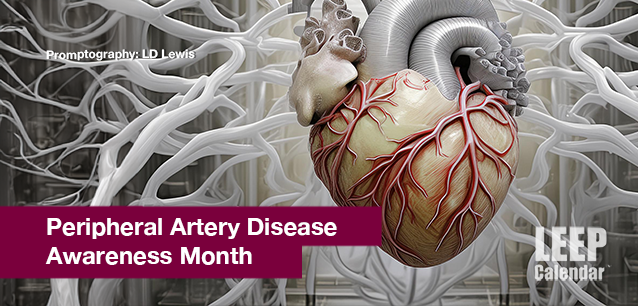 AD
AD
Today is: December 06
Scroll to explore events active on this date.
LEEP INK FEATURES

August? Absolutely!
In August, we live through the Dog Days of Summer. It's hot and often humid, and those who can leave for better climates do. Down south, winter is in full force. August is also known as "the ...

In The Heat of July: July 2025 Events
Is it hot enough (or cold enough if you're below the equator) for you yet? There is actually a day for that! Like every month, I pick a diverse collection of events you may or may not know about. This ...

May Blooms: Events in May 2025
Along with October, May is one of the most densely packed months of the year. It's before the summer humidity and the last whole month of the school year. The weather is warming in t...
About Peripheral Artery Disease Awareness Month
United States
Ends: Sep 30, 2025
DESCRIPTION:
PERIPHERAL ARTERY DISEASE AWARENESS MONTH: HIGHLIGHTING A SILENT HEALTH THREAT
Every September, the United States observes Peripheral Artery Disease (PAD) Awareness Month, a campaign dedicated to raising awareness about PAD, its risks, and prevention strategies. The American Heart Association (AHA), the Vascular Disease Foundation, and other health organizations champion this event.
WHAT IS PERIPHERAL ARTERY DISEASE AWARENESS MONTH?
Peripheral Artery Disease Awareness Month is a national effort to educate the public about PAD, a condition characterized by narrowed arteries that reduce blood flow to the limbs. The campaign aims to inform individuals about the symptoms, risks, and treatments associated with PAD, encouraging early diagnosis and proactive management to prevent serious complications.
THE HISTORY OF PAD AWARENESS MONTH
The observance of PAD Awareness Month began in 2007, initiated by the Vascular Disease Foundation and later supported by the AHA. PAD Month addresses the lack of public awareness about the condition, which affects millions of Americans but often goes undiagnosed. Through education and outreach, the campaign seeks to reduce the incidence of PAD and improve the quality of life for those affected.
IMPACT OF PERIPHERAL ARTERY DISEASE ON YOUR LIFE
Peripheral Artery Disease can significantly impact a person's life, leading to symptoms such as leg pain, cramping, and fatigue, especially during physical activities. If left untreated, PAD can cause severe complications, including:
Reduced Mobility—Pain and discomfort can limit a person's ability to walk and engage in daily activities.
Wounds and Infections—Poor blood flow can lead to slow-healing wounds and an increased risk of infections, particularly in the feet and legs.
Amputation—In severe cases, PAD can result in critical limb ischemia, potentially leading to amputation.
Increased Cardiovascular Risk—Individuals with PAD have a higher risk of heart attack, stroke, and other cardiovascular diseases.
PREVENTING PERIPHERAL ARTERY DISEASE
While not all cases of PAD can be prevented, adopting a healthy lifestyle can significantly reduce the risk:
Quit Smoking—Smoking is a significant risk factor for PAD. Quitting can improve overall vascular health.
Healthy Diet—Eating a balanced diet low in saturated fats, cholesterol, and sodium can help maintain healthy arteries.
Regular Exercise—Physical activity helps improve circulation and can reduce the risk of developing PAD.
Manage Chronic Conditions—Controlling diabetes, high blood pressure, and high cholesterol can prevent or delay the onset of PAD.
Regular Check-Ups—Routine medical check-ups can help detect early signs of PAD and other cardiovascular issues.
IS THERE A CURE FOR PERIPHERAL ARTERY DISEASE?
There is no cure for Peripheral Artery Disease, but you can manage it effectively with lifestyle changes, medications, and medical procedures. Treatment aims to reduce symptoms, improve quality of life, and prevent complications. Common management strategies include:
Medications—Drugs to lower cholesterol, control blood pressure, and manage pain can help manage PAD.
Lifestyle Changes—Quitting smoking, adopting a healthy diet, and exercising regularly are crucial for managing PAD.
Medical Procedures—In some cases, angioplasty, stenting, or bypass surgery may be necessary to restore blood flow to affected limbs.
Peripheral Artery Disease Awareness Month is an essential observance that underscores the importance of early detection, prevention, and management of PAD. The campaign aims to improve outcomes for individuals affected by this potentially debilitating condition by raising awareness and educating the public.
VIDEOS
SUPPORTING DOCUMENTS
Currently, this event does not have supporting documents.
ADDITIONAL IMAGES
Currently, this event does not have supporting images.
Where would you like to go now?
 AD
AD


/footer-logo.svg)
